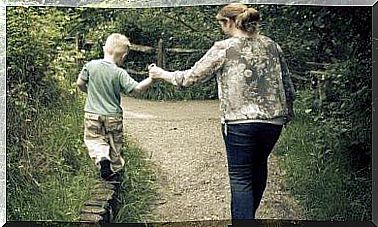It’s Not Selfish To Think Of Yourself

Often when we put ourselves first, others consider us selfish. But what does it really mean to be selfish? Perhaps we are misusing this adjective and, above all, unfairly. Next, we will consider this word, its effects, and how we can give ourselves time without feeling guilty about it.
Being selfish means thinking about yourself 100% of the time without considering others at all
Above all, to understand what it means to be a selfish person, let’s turn to the dictionary. Selfishness means when a person has too high views of themselves, and this makes him or her think disproportionately of his or her own interests without regard for others.

We all have our own values and beliefs that are pretty much unchanging, and they allow us to interpret the world and make it make sense. Our thoughts begin here. Therefore, it is not uncommon for each person to use the word “selfishness” based on his or her own experiences and how he or she understands the world. In other words, each person has their own perceptions of what it means to be selfish.
For some, selfishness means that a person has never done anything for others. Maybe you come to mind a person who refused to do service because he “didn’t have time” even though you yourself have always been his support. In the first case, this definition may be correct. But is this more specific second case true?
How do we feel when someone calls us selfish on the basis of one interaction, without considering all that we have done for that person? We feel confused and angry. We know it is unfair. Before we move on in this article, let’s make one thing clear: if we don’t do something to someone else when he has asked us for help, it doesn’t necessarily mean we’re selfish.
We cannot change the way others interpret the world
Here’s a really common situation: a person asks us to do something for him, and we can’t give him what he needs. Then that person calls us selfish, or at least he hints at it.
So we feel terrible, not only because he has condemned us negatively, but also because we find ourselves at a crossroads of interests where our interests have been proven to be less important. Who then behaves selfishly? Who thinks only of themselves and not of the rights of others as human beings?
Here’s one truth: we don’t have enough resources to try to change another person’s mentality, let alone run it successfully. That is, if someone interprets our actions as selfish without any effort to understand our situation, we need to ask ourselves two questions:
- Have we felt empathy for his problem?
- Despite the fact that we were unable to do what he asked for, when he asked, have we offered him another option?
If you answer both of these in the affirmative, always keep in mind this fundamental right: the right to reject a request without feeling guilty about it. In addition, it is good to keep in mind that we make a big mistake when we judge others on the basis of their behavior and not on the basis of their personality. For example, someone may behave petty without being mean, or slip without being clumsy.

An example of how you can think of yourself without being selfish
To better understand this, we’ll give you an example: Imagine you always wake up at the same time for several weeks. You do everything you need. At the end of the day, you have fulfilled all your obligations.
Now imagine that one morning you sleep fifteen minutes too long. Imagine that for some reason you couldn’t do everything you needed to do, and at the end of the day, you have some things left to do.
Are you an irresponsible person? Do you lack self-discipline? No, you just had a bad day and maybe you could act indiscriminately and irresponsibly – just for that one day.
The fact that you act this way doesn’t make you such a person with those traits. In fact, even if you have acted a lot in this way in the past, you may not be such a person anymore. The past is not always a good predictor of the present or the future.
We need to distinguish between misbehavior and being bad. It is not the same thing to be an unfair person and behave unfairly. Let’s analyze behavior, not a person.
Take advantage of the wind blowing to your advantage, but don’t let the wind lead you

Do you feel like you don’t have enough time for yourself? Do things ever come up that take all your attention and steer you away from your goals? Do you give in too much to other people? Do you feel like you are a weather vane at the mercy of the wind? You have to learn to reserve space for yourself, to think for yourself.
To do this, you need to learn two things that go hand in hand and are essential to our health and happiness: learn to say “no,” and learn to do it without feeling guilty.
It is true that this is a rather complex and nuanced subject. Therefore, we cannot give everyone the right rules to do this. We simply need to emphasize the importance of working towards it. If you have always been the person who has been for others and you have always forgotten yourself, you should know the following:
- Change is a process. Changing habits takes time, patience and effort. Usually our ways are connected to each other and changing one means changing the elements of the whole chain. For example, adopting a more polite attitude means changes in how we discuss and when we are silent.
- The people around us may not understand the change. If the people around us are always used to saying yes to everything, that first time you refuse something will be a surprise to them. Maybe they will even approach you and say you have become selfish. At this point, you must not lose sight of what you want for yourself. There will always be resistance to change, especially if this change affects someone else’s sense of comfort.
- Always analyze the situation objectively. If the request is not busy or does not necessarily require your presence; if you feel empathy with his problem and you have given him an option that is consistent with your own goals but still helps the other person, you have no reason to feel guilty.
In short, you can think of yourself without being selfish at the same time if you know how to maintain balance. If you really work on this instead of focusing on the way you talk about selfishness, you will find a balance in energy and giving time to others as well as yourself.









